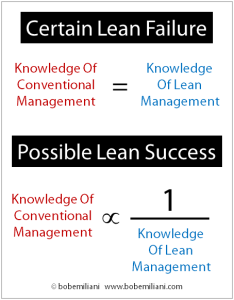The subject of coaching has become increasingly popular in recent years. Its focus is principally the supervisor-worker relationship, the point at which value-creating work is performed. Coaching is normally ex post facto, meaning that it begins after an organization has embarked on its Lean transformation. It makes sense to do that, but much more must be done. Coaching should extend to the highest levels of an organization, preferably ex ante, before the Lean transformation begins.
Too often, CEOs and presidents demand an organization embark on a Lean journey without first understanding what is required of them. They make fundamental errors such as:
- Leading in same ways that they have always led, and thus failing to recognize Lean as something totally different from what they know and do.
- Allowing some parts of the organization and their leaders to completely ignore Lean principles and practices.
- Delegate Lean practice to consultants and lower level people signalling that senior leaders have nothing new to learn.
- Failure to connect Lean to both strategy and employee learning and development.
 All of this occurs within the framework of seeking to improve short-term financial results. It is a remarkable failure to apply what one has repeatedly learned how to do in school: Conduct research to learn about something that you know nothing about. A terrible assumption is made by leaders: Because they know conventional management, they know Lean management (and, by extension, because they know conventional leadership, they know Lean leadership). The reality is that the more one knows about conventional management, the less one knows about Lean management. This inverse relationship helps us understand why most Lean transformations fail or fall short of expectations, frustrating leaders and workers alike.
All of this occurs within the framework of seeking to improve short-term financial results. It is a remarkable failure to apply what one has repeatedly learned how to do in school: Conduct research to learn about something that you know nothing about. A terrible assumption is made by leaders: Because they know conventional management, they know Lean management (and, by extension, because they know conventional leadership, they know Lean leadership). The reality is that the more one knows about conventional management, the less one knows about Lean management. This inverse relationship helps us understand why most Lean transformations fail or fall short of expectations, frustrating leaders and workers alike.
Simply put, leaders unwilling to learn are leaders unwilling to succeed.
Typically, many years pass before top leaders realize their errors. Without admitting they made any errors, leaders seek to make corrections. This re-work may succeed, but at a great cost in time and leadership influence and credibility.
Obviously, there is a need to coach top executives starting on Day 1, or preferably before they commit themselves to Lean management. But, what should they be coached on? Should they be coached on the technical aspects of Lean tools and Lean production, the overall Lean management system, or something else? While necessary, coaching leaders on technical details are insufficient given the mode by which leaders fail. Further, nested of cycles of coaching (the fractal nature of coaching) is disrupted because senior leadership teams need to be coached in specific things that people at lower levels do not.
The failures enumerated in the four bullet points, above, point to major flaws in leaders’ “basic way of thinking” about the economic, social, political, and historical aspects of business and processes improvement. For example:
- Economic – Short-term financial focus.
- Social – Separation between leaders and followers, as evidenced by leaders who have nothing new to learn while workers must learn and do new things.
- Political – Lack of leadership influence and credibility, the result of setting direction that one has no experience with and cannot speak to or do.
- Historical – The possibility that Lean management will fail, and the historical record that shows Lean frequently fails, including the principal causes of failure.
Mental rigidity among the top leaders assure that current conditions are maintained and that the economic, social, political, and historical target conditions are never achieved.
Leaders’ “basic way of thinking” about the economic, social, political, and historical aspects of business and processes improvement must first be diagnosed. Then, it can be corrected via coaching, preferably before an organization embarks on a Lean transformation. Why? Because knowing what is actually required will help them make an informed decision. Lean management will not be the right choice if leaders are unwilling to learn. Improving short-term financial results can be achieved in dozens of others ways.
If leaders truly want to change from conventional management to Lean management, then the most critically important coaching for them involves detailed explorations of scores of economic, social, political, and historical aspects of business and processes improvement. You will find my Lean leadership coaching manual to be a tremendous resource to help you move towards the “basic way of thinking” target conditions necessary for Lean success.
Finally, we must not forget that some important things cannot be coached or are very difficult to coach:
- Motivation, drive, and commitment
- Curiosity; deep thinking, observation, and questions
- Imagination and creativity
- Discipline for deliberate practice, to improve specific knowledge or capabilities
- Humility
This means that the people selected to be senior leaders must possesses the basic characteristics necessary to lead a Lean transformation. And they must be willing to take instruction from the coach and do exactly as the coach says.
